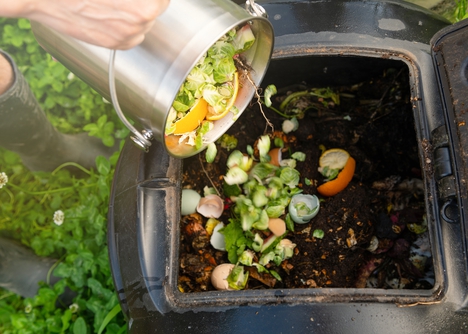Organic waste makes up a large part of our waste stream. If we cannot reduce our consumption from the source, we can do something else to help mitigate this organic waste. We do this by composting, which decomposes our food and yard waste (such as vegetables, fruit, and yard trimmings) into soil that can be used in gardens and fields. This type of recycling is just as important as recycling our paper, plastic, cardboard, metal, and glass!
COMPOSTING 101
What is Compost?
Compost is a dark, moist, and crumbly form of decomposed plant and animal matter. It smells earthy, like a rich forest.
Why Compost?
Compostable material accounts for 20 to 30 percent of all material deposited into landfills. Composting is a convenient way to dispose of yard and kitchen waste. Finished compost, when added to gardens, improves soil fertility by adding essential nutrients to the soil. Compost increases sandy soils' ability to retain moisture, thus requiring less watering. The structure of clay soils is improved by adding compost.
What goes in?
GREENS
(High Nitrogen containing materials)
Fruit and vegetable cores and peelings, Grass clippings, Green leaves, Corn husks, Weeds (avoid weeds with many seeds), Coffee grounds and filters, Teabags, Seaweed and algae, Manure
BROWNS
(High Carbon containing materials)
Dry leaves, Dry straw or hay, Shredded newspaper, Corrugated cardboard, Sawdust (small amounts), Wood chips, Corn stalks and corn cobs, Pine needles and cones (small amounts), Paper egg cartons
Add 1/3 Greens and 2/3 Browns mixed together or layered. Mix or turn occasionally. A temperature of 90-140 degrees is optimal. The material should be moist, not dripping or dusty. Add water or moisture-rich material if too dry. Add dry material and turn often if too wet.
What Stays Out?
Meat, Fat, Oils, Grease and bones, Cat or dog droppings, Weeds with many seeds, Milk, Cheese or yogurt, Fish scraps, Large amounts of ashes, Diseased plants, and Plants treated with herbicides or pesticides.
How To:
- Add in a shovelful of finished compost or garden soil to help kick-start the microbial activity in your pile.
- Compost also needs the correct amount of moisture to break down. Compost with the right moisture level should feel like a damp, wrung-out sponge. Too much moisture can cause temperatures to fall within the pile (and make it smell). Too little moisture slows down the decomposition rate and keeps the pile from heating up. Check your compost pile's moisture level once a week and adjust it if necessary by adding water to increase moisture or more browns to help dry the pile out.
- Turn the pile once a week to move material from the outside of the pile in. Turning also keeps the pile from compacting, which reduces airflow and slows down decomposition.
- You'll know your compost is finished when it no longer heats up and you can't identify any of the original materials. The compost should be dark brown, moist, and earthy smell.


